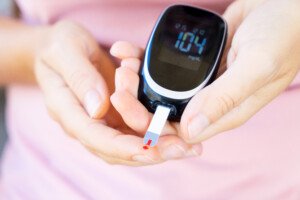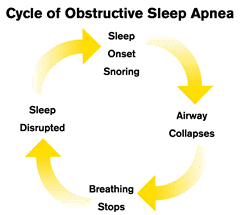
Poor sleep can lead to insulin resistance, which is a progenitor of type 2 diabetes.
There are several things you can do to reverse insulin resistance that’s caused by or made worse by poor sleep—as well as influenced by other factors.
What is insulin resistance?
It means the body loses its sensitivity to the hormone insulin. When this happens, more insulin is required (supplied by the pancreas) to bring down blood sugar.
Insulin transports blood sugar (glucose) to cells where it’s used for fuel.
The pancreas should not be pumping out high amounts of insulin to get this job done. Only smaller amounts should suffice – in which case, this would be “insulin non-resistance.”
If you have insulin resistance, you’re in trouble. However, this doesn’t mean that the fix isn’t easily possible.
“Insulin resistance from lack of sleep can be reversed,” says Stacy Mitchell Doyle, MD, resident physician of FoodTherapyMD and long-time advocate of plant-based nutritional protocols.
Dr. Doyle continues, “First, get more sleep. But also, recognize that your insulin resistance is probably not TOTALLY due to your sleep patterns. Your poor sleep could be caused by sleep apnea, which is usually due to being overweight or obese.”
Seven hours of quality sleep beats nine hours of fitful sleep.
Being overweight is a risk factor for obstructive sleep apnea (OSA), but thin people (including young) can have obstructive sleep apnea.
For instance, a skinny 30-year-old woman can have obstructive sleep apnea due to a combination of large tongue base and surplus pharyngeal tissue.
Of course, excess body fat will make this natural anatomy more vulnerable to disordered breathing events during sleep.

A thin person could also have a naturally large uvula (that punching bag shaped thing in the back of the throat) that causes obstruction during sleep.
Not all people with untreated sleep apnea snore.
Many people with untreated OSA unknowingly compensate during the day and thus, have no idea they have this condition. For example, “I don’t easily fall asleep watching TV because I combine TV viewing with housework to stay alert.”
Untreated sleep apnea is a well-established risk factor and even causative agent for insulin resistance and type 2 diabetes.
Other Contributors of Insulin Resistance
Dr. Doyle says, “Your diet also likely plays a role as well. If you are not eating enough unprocessed fruits and vegetables and eating too much meat and processed foods, then you are likely to develop insulin resistance.”
Chronic anxiety also fires up insulin resistance. Chronic stress puts the body in perpetual “fight or escape” mode.
One of the body’s responses to a perceived threat (whether it’s a charging rhino or workplace hostility) is to dump sugar into the bloodstream for a ready source of fuel to carry out the fight or flight.
But with modern day chronic anxiety, the fight or escape never comes to use up the extra sugar. So the surplus blood sugar remains: chronic insulin resistance.
Lousy sleep makes this worse, whether it’s caused by OSA or anxiety.
 FoodTherapyMD™ is the brainchild of Dr. Mitchell Doyle and recognizes that phytonutrients, the substances that make plant food so amazing, can be tailored to fight specific disease states.
FoodTherapyMD™ is the brainchild of Dr. Mitchell Doyle and recognizes that phytonutrients, the substances that make plant food so amazing, can be tailored to fight specific disease states.
 Lorra Garrick has been covering medical, fitness and cybersecurity topics for many years, having written thousands of articles for print magazines and websites, including as a ghostwriter. She’s also a former ACE-certified personal trainer.
Lorra Garrick has been covering medical, fitness and cybersecurity topics for many years, having written thousands of articles for print magazines and websites, including as a ghostwriter. She’s also a former ACE-certified personal trainer.
.


























